By Joyce Danso
Accra, July 19, GNA – Dr Edem Mahu, a Senior Lecturer at the University of Ghana, has called on countries in the Gulf of Guinea to work together to tackle ocean acidification locally and globally.
Tackling of ocean acidification required collective and coordinated efforts from countries along the Gulf of Guinea.
Dr Mahu said this at the ongoing BIOTTA training on ocean acidification for Ghana, Nigeria, Benin, Cote Ivoire, and Cameroun at the University of Ghana.
BIOTTA refers to Building Capacity in Ocean Acidification Monitoring in the Gulf of Guinea.
Ocean acidification is a direct consequence of rising atmospheric Carbon dioxide levels.
Dr Mahu said the phenomenon occurred when CO2 in the atmosphere dissolved into the ocean, consequently causing the pH of seawater.
The impact of Ocean Acidification includes weakening shells and skeletons of fin and shellfish, food web, and ecosystem disruptions, which had dire consequences on fisheries and livelihood.
“The Gulf of Guinea, with its rich biodiversity and vital economic resources, is particularly vulnerable to the impacts of this phenomenon.
As such, the BIOTTA project is not just timely but essential,” he said.
Dr Mahu, also the BIOTTA project Lead, said it aimed to develop a coordinated approach for measuring and observing ocean acidification in the GoG by adopting best practices, developing capabilities to undertake analysis and measurement of seawater ocean acidification.
She said it also sought to measure the chemistry parameters such as total alkalinity, pH, and dissolved inorganic carbon, using low cost, readily available and low-cost technology.
This helped to map out ocean acidification hotspots in BIOTTA member countries for long-term monitoring.

Dr Mahu commended the Partnership for Observation of the Global Ocean (POGO) and The Ocean Foundation (TOF) for their support and commitment to building capacity for ocean observation in the Gulf of Guinea.
Dr. Kaitlyn Lowder, Programme Manager, Ocean Science Equity Initiative at TOF, called for the adoption of best practices in ocean acidification research and development of capacity in underrepresented areas.
Dr Sophie Seeyave, the Chief Executive Officer of POGO, commended the BIOTTA Lead for leveraging the seed funding provided by POGO to make the project more impactful and sustainable through partnering with TOF.
Prof. Augustine Ocloo, the Dean, School of Biological Sciences, University of Ghana,
described the training as timely and called for more actions to fight ocean acidification and ensure a sustainable and resilient future for the Gulf of Guinea (GoG) and beyond.
The GoG region was rich in biodiversity and millions of people’s livelihood depended on it.
However, he said, the GoG was not immune to ocean acidity and that the changing chemistry of the ocean had far reaching impact on fisheries and communities.
Dr Benjamin Osei Botwe, the Head of Department, Marine and Fisheries Sciences, University of Ghana, underscored the urgency to address ocean acidification in the Gulf of Guinea through enhanced capacity building and collaborative efforts.
He said initiatives like BIOTTA projects are paving the way for a coordinated approach to monitoring and mitigating the impact of ocean acidification.
“As we equip local scientists with the necessary skills and tools, we empower them to be proactive in the conservation and management of our marine resources…. Together we can ensure a sustainable future for our oceans.”
“We have a dream to save our ocean and lives, and we know that this dream is possible with our collective efforts and the support from partners,” Dr Botwe said.
The five participating countries would be engaged to contribute to strengths in oceanography, chemistry, and biology thereby creating a strong network to support ocean acidification monitoring in the GoG region.
Participants would be provided with kits (GOA-ON in Box Kits) so they could measure ocean carbonate chemistry in various countries, initiate high-quality monitoring and address salient research questions, such as variability along their coastlines.
The workshop would provide hands-on and theoretical training for participants in ocean acidification measurements and connects researchers around the Gulf of Guinea.
GNA